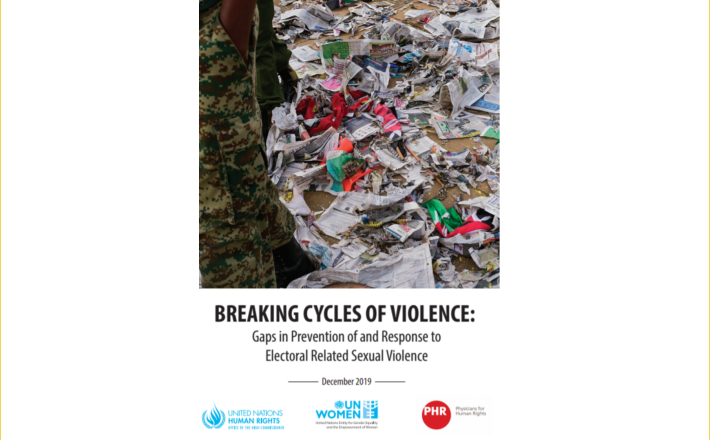Breaking cycles of violence: Gaps in prevention of and response to electoral-related sexual violence in Kenya
Source: Relief Web
Introduction
I was targeted because my husband is from a different community that was perceived to hold a differing political opinion from the one of the dominant community we live in.’
Survivor of sexual violence during the 2017 elections interviewed in this research Electoral-related sexual violence (ERSV) is a form of sexual violence, including rape, gang rape, sexual assault and defilement, associated with electoral processes and/or intended to influence or achieve a political end within an electoral process. In Kenya, sexual violence has been a recurrent feature of elections, which have been marred by deadly violence, unrest and serious human rights violations and abuses. Outbreaks of sexual violence during elections have been documented since the 1990s.Following the post-election violence in 2007/2008, the Commission of Inquiry into the Post-Election Violence (CIPEV), known as the ‘Waki Commission’, documented 900 cases of sexual violence perpetrated by security agents, militia groups and civilians against both men, boys, women and girls in a context of large scale violence, mass displacement and more than 1,000 deaths.
CIPEV provided critical recommendations for reform and was followed by the historic adoption in 2010 of a progressive Constitution with a robust Bill of Rights. Since 2010, an impressive set of laws, policies and standard operating procedures have been developed on prevention and response to sexual violence. Yet, during the general elections held in August and October 2017, within a context of localised violence, large numbers of cases of sexual violence perpetrated by persons in uniform and civilians were again documented. According to the Kenya National Commission on Human Rights (KNCHR), at least 201 Kenyans – most of them women and girls — were subjected to rape and other forms of sexual violence; [4] however the actual figure is likely higher due to under-reporting and the fact that KNCHR documented these in 11 of the 47 counties.
Click here to see the report.

Introduction
I was targeted because my husband is from a different community that was perceived to hold a differing political opinion from the one of the dominant community we live in.’
Survivor of sexual violence during the 2017 elections interviewed in this research Electoral-related sexual violence (ERSV) is a form of sexual violence, including rape, gang rape, sexual assault and defilement, associated with electoral processes and/or intended to influence or achieve a political end within an electoral process. In Kenya, sexual violence has been a recurrent feature of elections, which have been marred by deadly violence, unrest and serious human rights violations and abuses. Outbreaks of sexual violence during elections have been documented since the 1990s.Following the post-election violence in 2007/2008, the Commission of Inquiry into the Post-Election Violence (CIPEV), known as the ‘Waki Commission’, documented 900 cases of sexual violence perpetrated by security agents, militia groups and civilians against both men, boys, women and girls in a context of large scale violence, mass displacement and more than 1,000 deaths.
CIPEV provided critical recommendations for reform and was followed by the historic adoption in 2010 of a progressive Constitution with a robust Bill of Rights. Since 2010, an impressive set of laws, policies and standard operating procedures have been developed on prevention and response to sexual violence. Yet, during the general elections held in August and October 2017, within a context of localised violence, large numbers of cases of sexual violence perpetrated by persons in uniform and civilians were again documented. According to the Kenya National Commission on Human Rights (KNCHR), at least 201 Kenyans – most of them women and girls — were subjected to rape and other forms of sexual violence; [4] however the actual figure is likely higher due to under-reporting and the fact that KNCHR documented these in 11 of the 47 counties.
Click here to see the report.